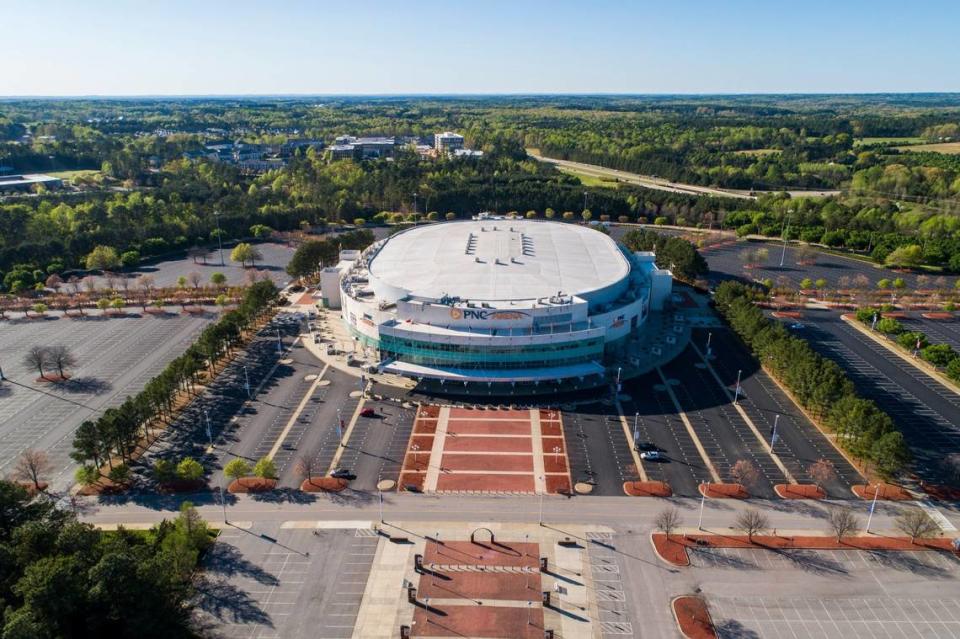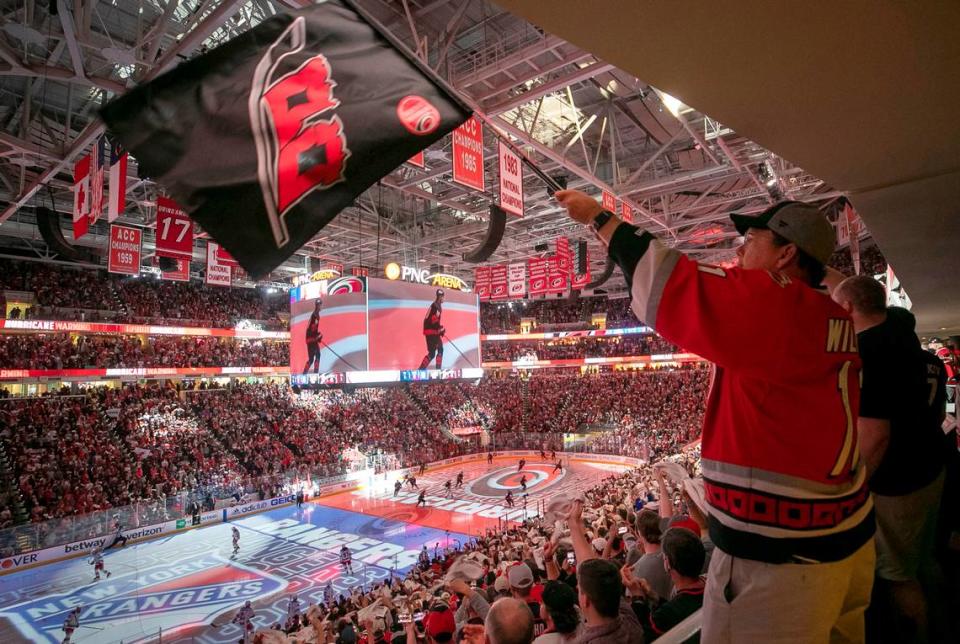Agreements on Hurricanes’ lease and new development open new chapter for PNC Arena
With the potential to change not only what it means to attend an event at PNC Arena and Carter-Finley Stadium but the entire face of West Raleigh, the arena authority and the Carolina Hurricanes on Tuesday agreed on a 20-year lease extension running through 2044 and a framework for team owner Tom Dundon to develop the vacant land and parking lots around the arena into an $800 million mixed-use development including retail, offices, housing, a hotel and a 4,000-seat indoor music venue.
The two agreements, approved Tuesday morning at a special meeting of the Centennial Authority, the government-appointed board that oversees the arena, were negotiated over a period of many months, securing the long-term future of the Hurricanes in Raleigh as well as paving the way to create a new in-fill urban center around the arena, which has sat isolated off Wade Avenue since it opened in 1999.
Combined with Friday’s recommendation that PNC Arena receive $300 million in tourism-tax funds for long-awaited renovations, Tuesday’s agreements open a new chapter in the arena’s history that will see massive changes both inside and outside the building beginning as soon as next summer.
“I think it’s a great deal for every party involved,” Centennial Authority chairman Philip Isley said. “We are taking care of the building for many, many years. We’ve listened to what concerns N.C. State had and we hope we’ve addressed those. We’ve made certain this area will continue to grow in a planned, phased-in approach. No one’s parking space is going to be completely obliterated for years to come. I believe once people start seeing how many good things are out there they’re going to really appreciate having the opportunity to go out there before or after games and events. And the 20-year lease keeps the team here.”
Isley asked N.C. State chancellor Randy Woodson to make the symbolic motion to approve the two term sheets, which were approved unanimously.
“The relationship between N.C. State and the Hurricanes has never been stronger,” Woodson said, adding, “this is a phenomenal step for all the tenants in this building and our great university.”
PNC Arena upgrades have been years in the making. Here’s how we got here
Hurricanes tied to arena through 2044
The extended lease replaces the extension the Hurricanes had signed through 2029 two years ago, because it removes all of the termination rights in the Hurricanes’ current lease — they could buy their way out as soon as the end of next season — and replace them with “standard non-relocation provisions” used by other NHL teams. It includes the stipulation that “the Hurricanes shall not relocate” unless the authority and the Hurricanes fail to “confer in good faith” on the “future of PNC Arena or a replacement arena” in 2039, when the building will be 40 years old.
The Hurricanes would also pay the Centennial Authority $4.5 million per season starting in 2029, escalating to $5.5 million over the next 15 years. Under the current lease, they pay no rent and receive an operating subsidy of almost $2 million from the authority. They’ll also pay $10 million to construct a sportsbook and upgrade office space and premium seating within the building, while the authority commits to spend the full $300 million in tourism-tax funds to improve the arena.
The new lease also asks the Hurricanes to use “best efforts” to host the NHL All-Star Game within three years of the completion of renovations, and another Stadium Series game within the next five years and “time to time hereafter.” The Hurricanes last hosted the NHL All-Star Game in 2011, while February’s Stadium Series game at Carter-Finley Stadium was a tremendous success for the team, N.C. State and the NHL.
Dan Barrett, the CAA ICON consultant who managed the process for the Centennial Authority, said he spoke with NHL commissioner Gary Bettman in Iceland on Monday and that Bettman agreed to bring those events back to Raleigh “in a timely manner.”
COMPLICATED NEGOTIATIONS
Dundon approached the authority not long after purchasing the team in 2018 to activate his right, given in the Hurricanes’ original arena lease, to develop the land around the arena after Peter Karmanos, the previous owner of the team, never expressed any interest in doing so.
But with several negotiated agreements with N.C. State dating back to how the building was originally constructed – it began as a new basketball arena for the Wolfpack, before the Hurricanes moved south from Hartford, Conn., after plans had already been drawn up — and because the arena property includes state-owned land, a consultant hired by the authority identified almost three dozen stakeholders who needed to sign off on any development, including N.C. State and several state agencies.

Negotiations on a lease extension with the Hurricanes were predicated on the ability to develop the land, while the tourism-tax funding to renovate the 24-year-old arena was predicated on a long-term commitment from the Hurricanes. The five-year extension the Hurricanes signed in 2021 was designed to give both sides time to negotiate a longer-term agreement and explore the future of the arena and its surroundings.
Since Bettman’s visit to Raleigh in May 2022 that jump-started negotiations on all three separate but simultaneous tracks – renovations, development and the Hurricanes’ lease – it has taken almost 17 months to get all of the various parties to come to Tuesday’s agreements.
The two term sheets still have to be fleshed out into final agreements, and the City of Raleigh and Wake County still need to approve the tourism-tax recommendations — the city votes Tuesday and the county next Monday — but for the first time there is a road map in place to take PNC Arena and its environs into the future.
“We think this could be one of the biggest economic development projects in the history of the region,” Barrett said.
A 365-DAY ARENA DISTRICT
Dundon, a Dallas billionaire, intends to lead the development with partners from Texas, but has already spoken with several Triangle developers about taking on parts of the project. According to the agreements, the first $200 million, 20-acre phase of development would include a sportsbook, 100,000 square feet of retail and restaurant space, 150,000 square feet of office space, 200 residential units, with 10 percent reserved for affordable family and workforce housing, and a 150-room hotel.
Not included in that $200 million, but included in the first phase, is the $40 million music venue, which Dundon has said he envisions as an indoor-outdoor space.
As PNC Arena development plans unfold, could West Raleigh be next ‘it’ destination?
All of it is designed to bring people to the arena area when there are no events scheduled and give attendees new dining options before and after events. Currently, there are no bars or restaurants on the arena property outside of PNC Arena itself, which has given rise to a famous tailgating culture around both the Hurricanes and Wolfpack football -- unusual for hockey, not so unusual for college football.
There are almost 80 acres available for development that are currently surface parking lots or open land, an area that does not include any of the parking lots surrounding Carter-Finley Stadium to the south of the arena. The agreement obligates the Hurricanes to replace 95 percent of any surface parking spaces consumed by development, with half of that remaining surface parking and the other half in parking decks. A five-acre “tailgating zone” would be protected on arena property closest to Carter-Finley.
“N.C. State was focused on the transition from their current sporting events,” Barrett said. “They wanted that maintained and that it would be a reasonable transition over time.”

Raleigh mayor Mary-Ann Baldwin called the development a “game-changer” last fall, “a tremendous opportunity to really prepare for the future of our city and be at that next level.”
According to the term sheet, the Hurricanes will be responsible for all infrastructure improvements to the site, including improved access from Wade Avenue and Edwards Mill Road, in exchange for a continuation of the site’s current tax abatement, but pay property tax after that. They would also pay 6 percent of the land value, increasing annually with inflation, to the Centennial Authority to lease the property through 2096 — when the arena’s lease with the state expires, tying the development to the arena — starting with the 20-acre parcel in a location to be “mutually agreed” upon with the authority.
OPTIONS FOR PNC RENOVATION
Inside the building, the Centennial Authority has already been given a menu of potential renovation options by its architects and consultants, including new concession stands that open into the arena itself, private clubs under the stands, a rooftop deck, a new exterior and an expansion to office and backstage space at the north end of the arena. A new traffic entrance off Edwards Mill, at the Wade Park Boulevard stoplight, was proposed as part of the renovations but may be overtaken by the development plans.
Setting priorities: Centennial Authority gets further update on PNC Arena renovation
The next step in those renovations is to price the options and select a package that fits both the $300 million allocated by the city and county and the need to bring the arena up to modern standards, then have construction plans prepared. Isley said he thinks that process can be completed in time to begin the first phase of construction in summer 2024. The other question is how far the authority can stretch that $300 million in the face of rapidly escalating costs for construction materials.
“We knew there was a minimum bar we needed to achieve to do the things we needed to do, not the least of which was retain the Hurricanes and give the arena the refresh that the building and the community deserve,” authority member Doyle Parrish said of the allocation. “We got over the bar, but barely.”
Along with all the other changes to the arena, a new name could be coming as well for the first time since 2012, when the RBC Center (previously the Entertainment and Sports Arena) became PNC Arena. The Centennial Authority, the Hurricanes and PNC Bank agreed to a short-term extension of the bank’s existing naming-rights agreement last fall with the intention to re-sell those rights once the development around the arena was approved, opening up potential new sponsorship markets.
PNC Arena upgrades have been years in the making. Here’s how we got here

